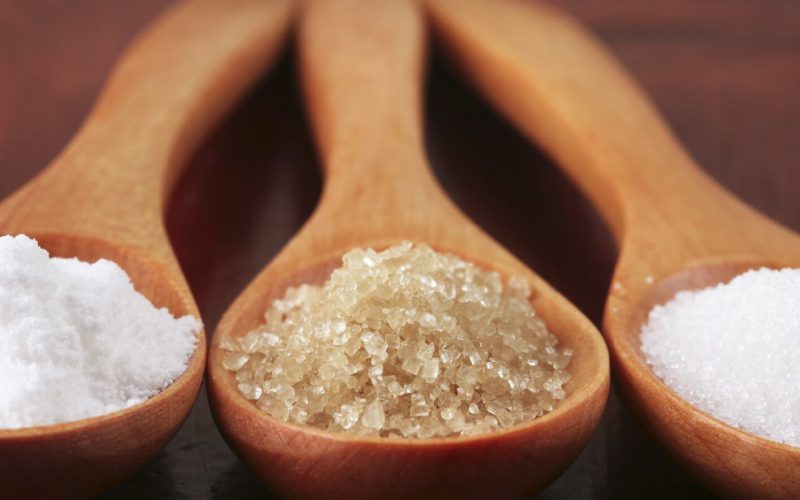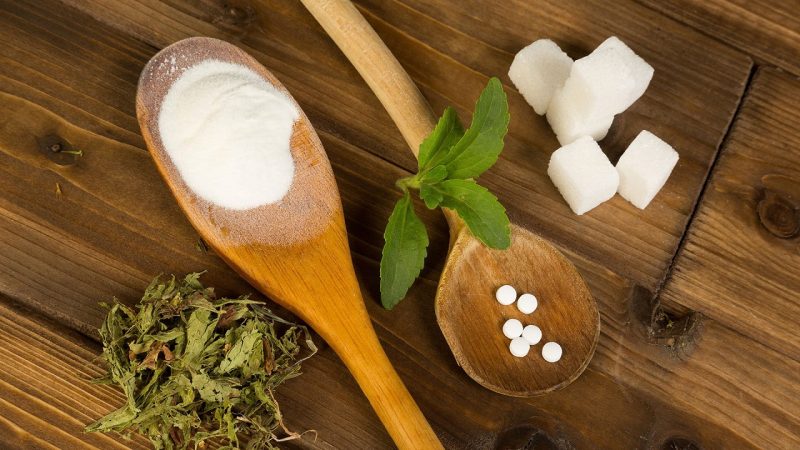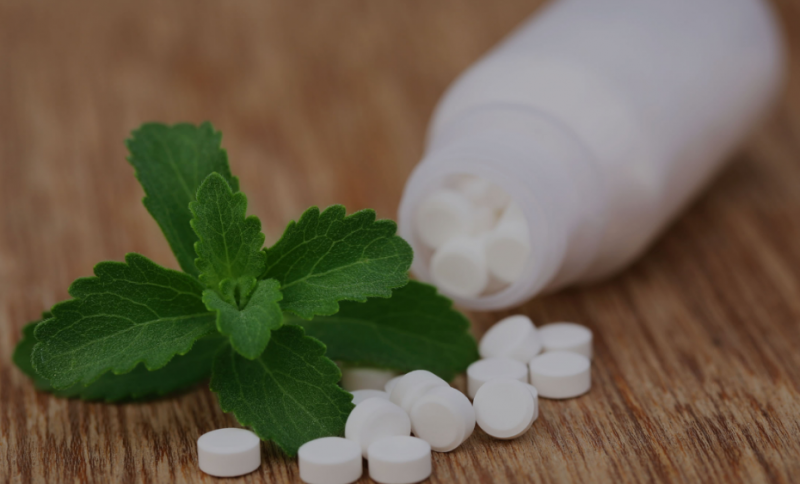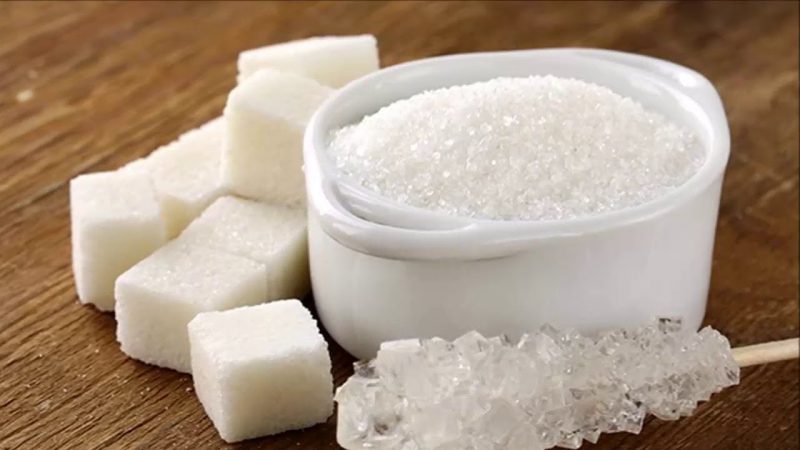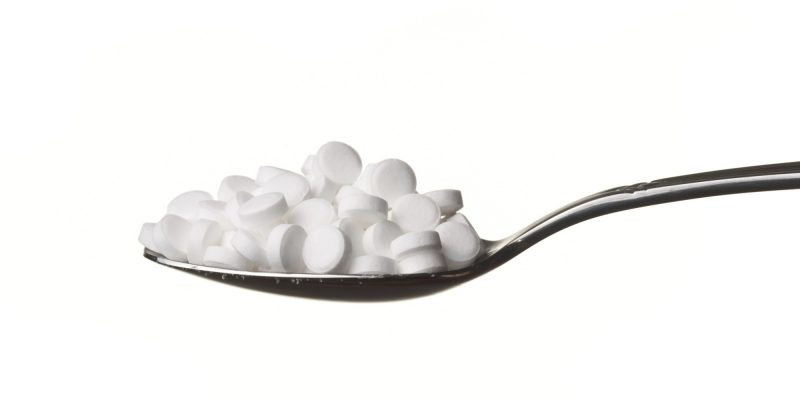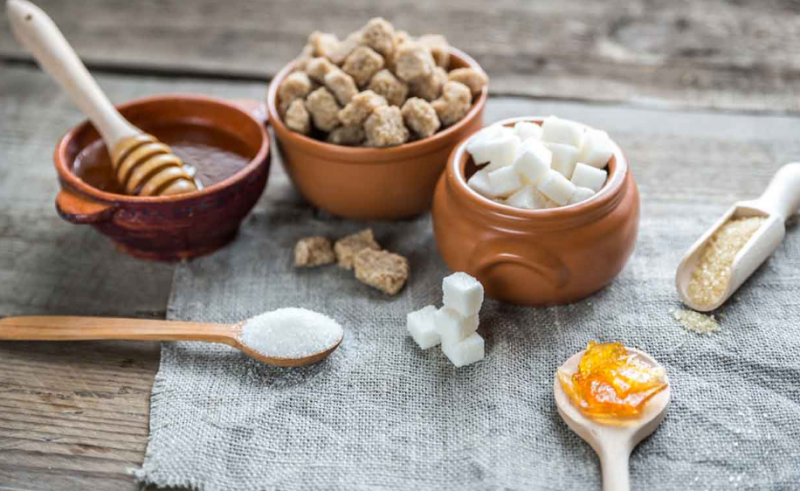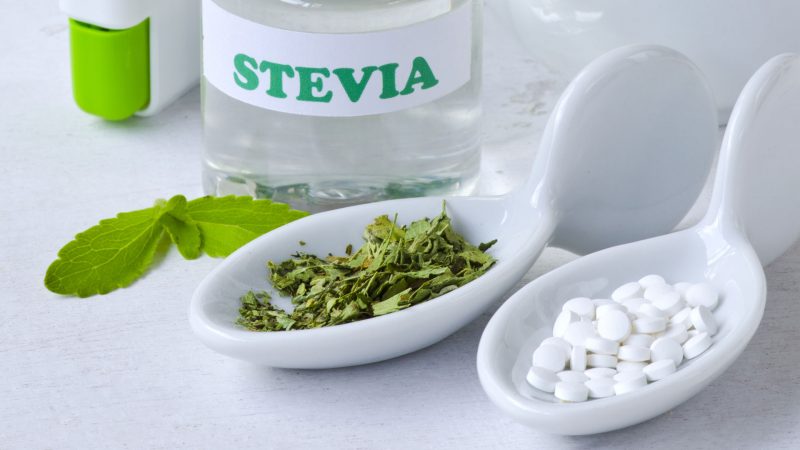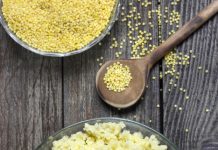Sugar sweeteners help lower your calorie intake. What sweetener to choose, if you need to give up sweets, and whether such a substitution is justified, we will try to figure it out together.
Material Content:
Types of mixtures, composition and calorie content
First you need to learn how to distinguish between sweeteners and sweeteners. They differ in composition, calorie content and other parameters.
Sweeteners are high-calorie carbohydrates, like sugar, but with a much lower glycemic index.
Sweeteners are very different in structure from sugar, they can have zero and close to zero calorie content and a sweet taste that is hundreds of times more intense than sugar.
On sale are sweeteners in the form of mixtures.
When choosing, you need to pay attention to the composition indicated on the package and calorie content:
- “Sladis Lux” (aspartame) - 400 kcal / 100 g;
- "Susli" (cyclamate, saccharin) - 11 kcal / 100 g;
- Milford Suess (cyclamate, saccharin) - 20 kcal / 100 g;
- Novasvit (cyclamate, saccharin) - 53 kcal / 100 g;
- Sucradayet (saccharin) - 20 kcal / 100 g.
Of particular interest is the FitParad range of sweeteners based on natural ingredients. You can find 8 varieties of this mixture, differing in sweetness and number of calories. The caloric content of each sweetener depends on its composition. So, for FitParada No. 7 it is 1 kcal per 100 g, for No. 11 it is 203 kcal, No. 8 and 10 it is 0 kcal.
The benefits of sweeteners for the human body
The benefits of sweeteners and sweeteners are understood primarily by those who suffer from chronic diseases. They are used by people who are trying to lose weight, monitor the calorie intake, play sports. With moderate and competent use of these substances, the risk of developing negative consequences is minimized. But sweet can bring many reasons for sadness.
Why is sugar dangerous? A slight increase in blood glucose above the physiological norm (5.5) leads to the launch of pathological processes in the vascular wall. Chronic inflammation, atherogenesis appears, endothelial function is impaired (the ability of the vessel to expand if necessary). This leads to the development of cardiovascular diseases, atherosclerosis, heart attack and stroke.
Diabetes use
In a healthy person, the use of sugar leads to the production of insulin. But in diabetics, the sensitivity of the pancreas is reduced, so the glucose level can significantly exceed the physiologically normal level. This leads to the development of vascular pathology, loss of vision and other serious disorders. Therefore, low-calorie, glucose-free sweeteners are vital for diabetics who love sweets.
After consulting with your doctor, you can choose the Fit Parade sweetener that is most suitable in composition.
The recommendations for the mixture indicate the categories of potential consumers - people with diabetes, obesity, hypertension.
Use during pregnancy - for or against
There are conflicting opinions regarding the safety of sweeteners during pregnancy. If you irresistibly want sweets, they can reduce the calorie content of the diet, and not gain excess weight without giving up your favorite taste.
On the other hand, artificial sweeteners can penetrate the placenta well and can harm the development of the child. Cyclamate is especially dangerous, which, according to some reports, has a carcinogenic and mutagenic effect. It is strictly forbidden to use, especially in the first trimester of pregnancy. It is better not to risk the health of the unborn baby, and abandon the sweeteners even during pregnancy planning.
Natural sweeteners can not do harm, but they will not be able to solve the problem of excess weight with their help. The caloric content of fructose is 399 kcal per 100 g, for xylitol and sorbitol - a little less.
A review of the best sugar substitutes
The most famous sweetener is fructose. It has a caloric value, like sugar, but it is almost 2 times sweeter than it, its GI is 20 units. Fructose is completely harmless, it is found in all fruits. This sweetener is suitable for diabetics if consumed wisely.
Other natural substitutes are xylitol and sorbitol. The first is obtained from ears of corn or birch bark, and the second from the fruits of mountain ash. They are similar in calories to fructose. By the intensity of the sweet taste, xylitol is close to sugar, and sorbitol is almost half as sweet. The glycemic index of these sweeteners is low. With an overdose of sorbitol, digestion may be impaired, it is recommended to consume it no more than 10 g per day.
Sweeteners:
- Aspartame is 160 to 200 times sweeter than sugar. It has no aftertaste, but has a pleasant sugar aftertaste. The disadvantage of aspartame is that it does not tolerate heat. At high temperatures, it transforms into a toxic substance that can harm the body. Therefore, you can not leave soda in the heat, in which aspartame is added for taste.
- Saccharin is 450 times sweeter than sugar. It has a pronounced bitter aftertaste. At one time, this substance was suspected of carcinogenicity, but this was not confirmed. Nowadays, it is the cheapest of all sweeteners, and it can be bought in any country.
- Sucralose is a good sweetener, similar in taste to sugar, safe for the body, tolerates heat well.
- Stevia and steviosides - at one time this natural sweetener was suspected of mutagenicity. Therefore, in some countries of Europe it was banned. These fears were not confirmed, and the bans were lifted. To taste, stevia is inferior to many sweeteners. She has a bitter taste.
Mixes "FitParad" are considered one of the best in the modern market. They contain natural and artificial sweeteners. Nutritionists recommend consuming these sweeteners for type 2 diabetes.
Natural sweeteners
Natural sweeteners are obtained from natural raw materials. So called sweet substances obtained artificially, if they are found in nature.
A list of some natural sweeteners:
- glycerol;
- isomalt;
- dactitol;
- curculin;
- lactitol;
- maltitol;
- miraculin;
- osladin;
- stevioside;
- thaumatin;
- tagatosis;
- filodulcin;
- erythritol.
These substances have a different chemical nature. Some of them are polyhydric alcohols, others are proteins. The stevia sugar substitute, the steviosoid obtained from the plant, is a terpenoid glycoside, it is 200 times sweeter than sugar.
Sweeteners and weight loss. Debunking Myths
The use of sugar causes a rapid increase in blood glucose, energy production. If this energy is not spent on physical work, fat stores are formed. A person who eats a lot of sweets and leads a sedentary lifestyle, quickly gaining excess weight.
On the one hand, sweeteners help to restrain from eating sweets when you really want it. But on the other, it should be borne in mind that if there is a carbohydrate dependence, it is only supported by sugar substitutes. This addiction needs to be treated.
During the use of artificial sweeteners, a mechanism is launched that is responsible for the processing of glucose necessary for the body. But this substance does not enter, which leads to an imbalance, malfunction of the digestive tract and endocrine glands.
When receptors feel the tongue have a sweet taste, enzymes are released that contribute to the processing of carbohydrates. The pancreas produces insulin, but sugar is not delivered. The level of glucose in the blood decreases below normal, a state of hypoglycemia occurs, an irresistible feeling of hunger. A man tries to eat something high-calorie, containing fast carbohydrates, and instead of losing weight, he continues to gain it.
Therefore, when losing weight, it is necessary to adhere to the correct diet, and it is better to refuse sugar than replace it with sweeteners.
Contraindications and possible harm
The harm or benefits of sweeteners and sweeteners cannot be evaluated without taking into account the health of the person who uses them. If you compare these substances with chips, smoked legs or cheap sausages, the first place comes not harm, but the appropriateness of use. However, side effects should not be forgotten either. Consider the overall negative effect on the body of artificial sugar simulators.
When sugar is consumed, glucose enters the body. In sweeteners, this substance is not.
This has unpleasant consequences:
- Glucose, which is found in sugar, serves as food for the brain. With its lack, the brain suffers. When sugar drops below 4 mmol / L, hypoglycemia and even loss of consciousness can occur.
- After sugar enters the blood, hormones of joy - serotonin and dopamine - are produced. After the use of the sweetener, this does not happen, the body remains unsatisfied.
- The bacteria that inhabit the intestines play an important role in maintaining carbohydrate metabolism in the body. If the intestinal microflora is in order, diabetes does not develop. It turned out that glucose nutrition is important for bacteria. When a person uses an artificial sugar substitute, the microflora suffers and dies. This leads to a risk of developing a prediabetic state and diabetes.
A number of sweeteners cause the formation of cancerous tumors in animals, on which the safety of these substances is tested. Such experiments are not performed in public, but it is necessary to know about the possible risk.


